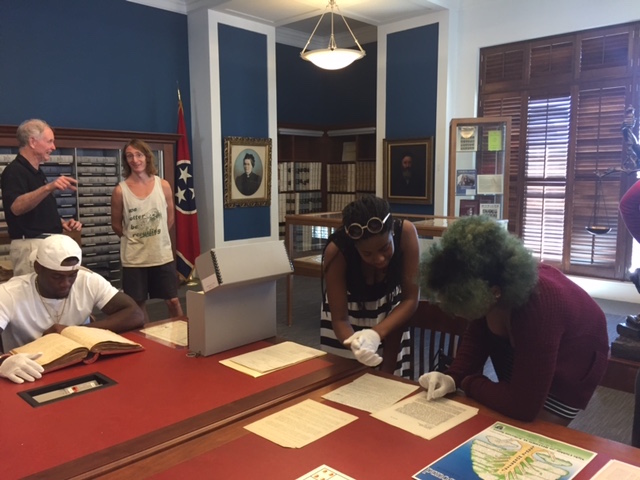Home » Historic Black Nashville » Recapping the first offering of Historic Black Nashville
Recapping the first offering of Historic Black Nashville
Posted by anderc8 on Thursday, February 9, 2017 in Historic Black Nashville, News.

Vanderbilt History Professor Jane Landers
Written by Vanderbilt History Professor Jane Landers
It was a true pleasure co-teaching the new University Course Historic Black Nashville with my colleague from the Law School Daniel Sharfstein last semester. We both got tremendous gratification from seeing our students engage with the varied materials available for exploring our city’s missing past. As they put on white cotton gloves and carefully turned yellowed manuscript pages during site visits to the Nashville Public Library, the Tennessee State Archives, and the Special Collections at Fisk University, they, too, became historians. Some later returned to those archives to pursue independent research for their final papers.
Our class also learned about Nashville’s black history through visits to our city’s important public history sites. Nationally-recognized archaeologist Dr. Larry McKee, who excavated the cabins inhabited by President Andrew Jackson’s slaves at the Hermitage, asked the students to think about what proximity and distance from the “Big House” meant for the enslaved; what resources were available to them and what different labor assignments might entail. Students were later able to go online and view artifacts like marbles, eyeglasses, and slates Dr. McKee unearthed in the “hidey holes” of the slave cabins, learning more about the people who produced them.

Students conduct research at the Metro Archives
Another highlight of our class was the site visit to Fort Negley, which was led by the preeminent historian of black Nashville, Dr. Bobby Lovett. Fort Negley was the largest inland stone fort built during the Civil War, largely by the labor of several thousand escaped slaves and free blacks who had fled to the Union forces. Later Mona Frederick, Executive Director of Vanderbilt’s Robert Penn Warren Center for the Humanities, donated a permanent marker to the site to memorialize the freedom seekers who built Fort Negley. Prof. Sharfstein discussed the site’s significance in the panel discussion that followed.
Students in Historic Black Nashville also heard guest lectures by award-winning Vanderbilt faculty authors like Richard Blackett, from the Department of History, who has just completed a major book on the Fugitive Slave Act; and Gabriel Briggs, from the Department of English, who wrote about Nashville’s black community in the early twentieth century. Local historian, and Vanderbilt graduate, Paul Clements, also shared his deep knowledge of frontier Nashville with our class and was a wonderful guide through the Metro archives. We also appreciated Vanderbilt graduates Crickett Harmer, Hunter Moore, and Stephen Doster, who took this course in its first iteration through the Masters of Liberal Arts program and shared their own research findings with our class.
 We were grateful also for the great support we received for this innovative course from Vanderbilt librarians, Jason Schultz, Deborah Lilton, and Lindsey Fox who introduced the students to the primary sources, websites, and mapping programs available for their interdisciplinary research projects.
We were grateful also for the great support we received for this innovative course from Vanderbilt librarians, Jason Schultz, Deborah Lilton, and Lindsey Fox who introduced the students to the primary sources, websites, and mapping programs available for their interdisciplinary research projects.
We look forward to co-teaching the next Historic Black Nashville class in Spring 2018, and building on the research accomplished by our first cohort of students. There is so much more still to learn!

©2026 Vanderbilt University ·
Site Development: University Web Communications